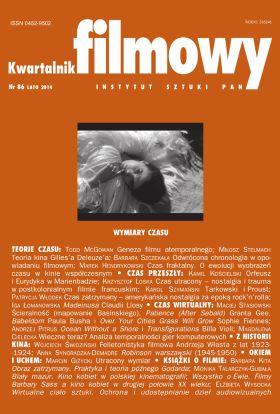Tarkowski i Proust. "Zwierciadło" i "W poszukiwaniu straconego czasu" - "co innego", a przecież "jedno i to samo"
Tarkovsky and Proust. "The Mirror" and "In Search of Lost Time" - "Something else" but "one and the same"
Author(s): Karol SzymańskiSubject(s): Theatre, Dance, Performing Arts
Published by: Instytut Sztuki Polskiej Akademii Nauk
Keywords: Tarkovsky Andrei; Proust Marcel
Summary/Abstract: Szymański considers in his essay what connects Marcel Proust’s "In Search of Lost Time" and Andrei Tarkovsky’s "The Mirror", and what allows one to consider these masterpieces to be Deleuzian "something else", and yet "one and the same". The primary creative impulse for Proust and Tarkovsky was the need to tackle the problem of temporality and transience. They used memory and their works of art in order to recover the time lost. The act of remembering was not an end in itself – memories and impressions were supposed to aid discovering the truth about the world and “ego”. The result of the existential and artistic effort to recover the past was the discovery of true and timeless “ego” and the ability of its creative expression (where “remembering” also meant “creating”). The works of Proust and Tarkovsky, made authentic by the experience of their creators, are to be “a way of salvation”, and a “secular gospel” for readers and viewers.
Journal: Kwartalnik Filmowy
- Issue Year: 2014
- Issue No: 86
- Page Range: 104-112
- Page Count: 9
- Language: Polish

